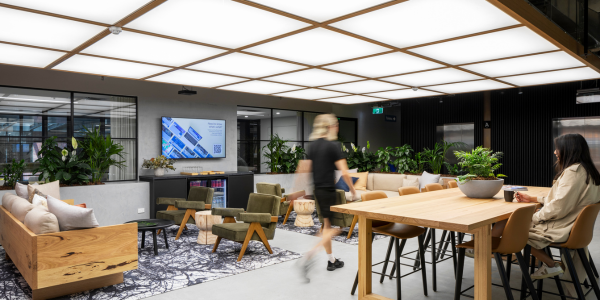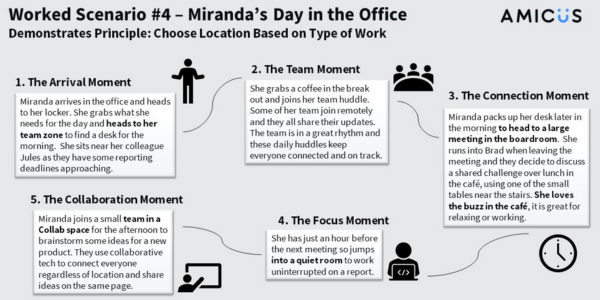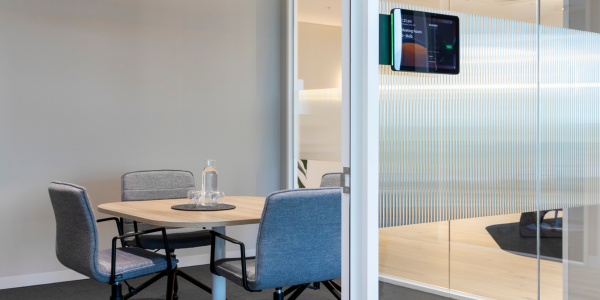In the post-lockdown era, most organisations have established an approach to hybrid working for their employees.
While some advocate for a return to the office for four or five days a week, the majority are aiming for a more balanced split of two or three days, using various methods such as the "3-2-1" model. These approaches rightly rely on a degree of autonomy and discretion by both staff and their leaders, recognising that flexible approaches to hybrid work are likely the most effective at boosting performance, enhancing the employee experience, and fostering a more engaged workplace culture.

However, a gap emerges when the approach is flexible and all that's provided are some rules of thumb and high-level direction. So, how do you equip your teams to make hybrid work... work?
One effective strategy is to use worked scenarios. These scenarios, illustrated in the example below, tell a story that demonstrates how the high-level principles will manifest in practice. They can range from choosing a location that aligns with the person's activity type or purpose to other nuanced aspects of hybrid work.

To implement this strategy effectively, organisations should consider the following steps:
#1 Develop a Repertoire of Worked Scenarios
Start by creating a variety of scenarios that showcase different ways employees can implement the hybrid work approach. These scenarios should be practical and align with the organisation's goals and culture.
#2 Collaborate with Staff
Involve employees in the scenario-building process to ensure that the scenarios are realistic and relevant to their daily work experiences. This collaboration fosters a sense of ownership and engagement among employees.
#3 Include Scenarios for Leaders
Create or co-create scenarios specifically tailored to leaders, highlighting their role in supporting and facilitating hybrid work within their teams. This ensures that leaders are equipped with the knowledge and tools to effectively manage hybrid teams.
#4 Group Scenarios by Persona
Organise scenarios based on different employee personas, such as "Focus Fred" or "Collaborative Cass," to provide targeted guidance that resonates with employees' working styles and preferences.
#5 Publish a Comprehensive Guide
Compile all scenarios into a 'ways of working' guide that serves as a reference for employees and leaders alike. Regularly update this guide with new scenarios to reflect evolving work practices and challenges.

By incorporating worked scenarios into their approach, organisations can offer concrete examples and practical guidance to support their teams in effectively navigating the complexities of hybrid work. These scenarios serve as tangible illustrations of how employees can implement the hybrid work model in their day-to-day routines, addressing various challenges and opportunities that may arise.
Organisations empower their employees with the knowledge and confidence to adapt to hybrid work arrangements seamlessly when they present real-life situations and solutions. Worked scenarios foster a sense of ownership and collaboration among employees, as they are involved in co-creating scenarios that reflect their unique roles and responsibilities.
Ultimately, by leveraging worked scenarios, organisations can facilitate a smoother transition to hybrid work and promote a culture of innovation and agility within their teams.
Want to know how we can help with your Workplace Strategy needs? Head to our Workplace Strategy Solutions page.
 Steve’s light bulb moment was on Day 1 of being a High School teacher. It struck him how deeply our environments – and the assumptions that come with them - shape how we think, feel and behave. This insight led to a blur of teaching awards, international keynotes, academic publishing and leadership roles. In 2016 he joined the commercial world, focusing on organisational culture and flexibility. An expert in hybrid work set ups, Steve mixes inspiring facilitation, data, and diplomacy to find the right answers to the big questions about the future workplace, ways of working and the human experience.
Steve’s light bulb moment was on Day 1 of being a High School teacher. It struck him how deeply our environments – and the assumptions that come with them - shape how we think, feel and behave. This insight led to a blur of teaching awards, international keynotes, academic publishing and leadership roles. In 2016 he joined the commercial world, focusing on organisational culture and flexibility. An expert in hybrid work set ups, Steve mixes inspiring facilitation, data, and diplomacy to find the right answers to the big questions about the future workplace, ways of working and the human experience.
Click here to connect with Steve.
Sydney
Level 10, 2-4 Bulletin Place
Sydney NSW 2000
Phone: 1300 360 877
Melbourne
Level 2, 517 Flinders Lane
Melbourne VIC 3000
Phone: 1300 360 877
Brisbane
Level 8, 344 Queen Street
Brisbane QLD 4000
Phone: 1300 360 877
Amicus QLD Contracting Pty Ltd
QBCC Licence No: 15240138